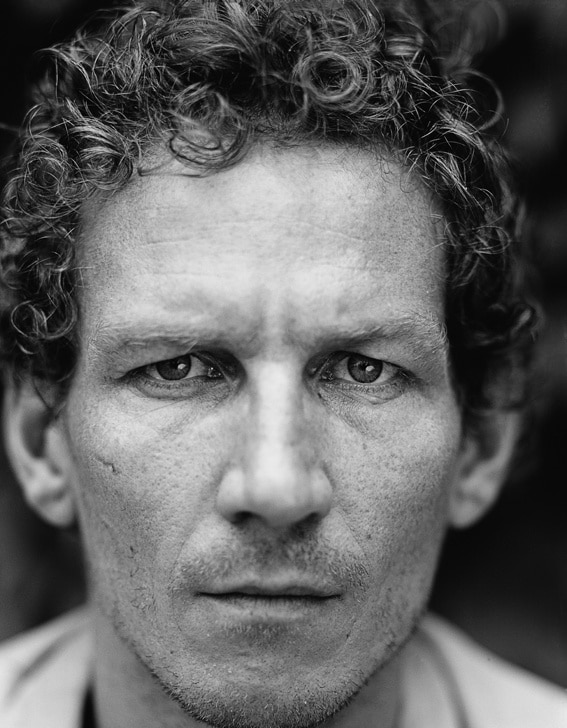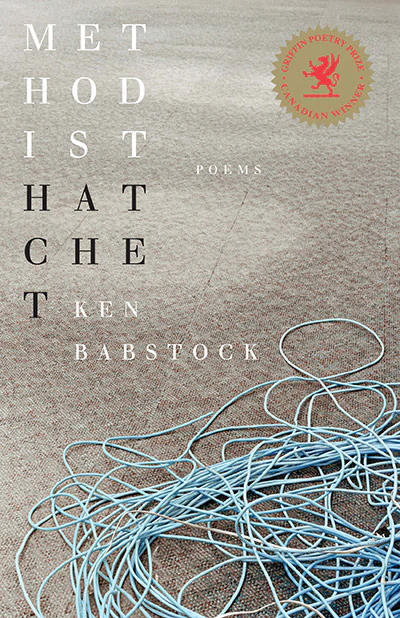
Ken Babstock was born in Newfoundland and raised in the Ottawa Valley. He is the author of three previous collections of poetry, including Airstream Land Yacht which won the Trillium Book Award, was shortlisted for the 2007 Griffin Poetry Prize and the Governor General’s Literary Award and was named a Globe and Mail Top 100 book. Ken Babstock lives in Toronto.
Methodist Hatchet was also shortlisted for the Trillium Book Award.


- 2012
- 2007
Judges’ Citation
The feature of Airstream Land Yacht that seems most striking, on a first reading, is its range: here we find a poet who can do almost anything
Judges’ Citation
Babstock is the live wire in the gene pool: stirring things up, rocking boats, disjoining easier conjunctions, jolting the culture’s DNA.
Selected poems
by Ken Babstock
Cargo has let down
her hair a little and stopped pushing
Pliny the Elder on
the volunteer labour
During summer it was all Pliny the Elder,
Pliny the Elder, Pliny
the – she’d cease only
for scotch thistle, stale Cheerios, or to reflect
flitty cabbage moths
back at themselves
from the wet river-stone of her good eye. Odin,
as you already know,
was birthed under
the yew tree back in May, and has made
friends with a crow
who perches between
his trumpet-lily ears like bad language he’s not
meant to hear. His mother
Anu, the jennet with
soft hooves of Killaloe, is healthy and never
far from Loki or Odin.
The perimeter fence,
the ID chips like functional cysts slipped
under the skin, the trompe
l’oeil plough and furrowed
field, the UNHCR feed bag and visiting
hours. These things done
for stateless donkeys,
mules, and hinnies – done in love, in lieu of claims
to purpose or rights –
are done with your
generous help. In your names. Enjoy the photo.
Have a safe winter
outside the enclosure
Copyright © 2011 Ken Babstock
Autumn News from the Donkey Sanctuary
Notice those days when everything sounds a little lewd? YIELD
signs at hidden corners, Downtown Rugs, the word ‘oubliette’
appearing innocently enough in an essay on circus workers, yet
when you’ve chased it down in the COD it’s lying under ‘ouananiche’
and looming over ‘ouch.’ When the eye notes that the pop.
of Ouagadougou sits at 690,000 a shower seems in order.
Should there not be a shield, a form of protection the out-there
can employ against the push the blue-lensed
the crotch-clutching urgency making a mess of in-here?
We ought to keep it to ourselves; between ourselves;
draw the curtains. Oughtn’t we?…Contractions have begun.
or when Merrill said to Jackson, this ought to be fun!
After all, ‘Ouija’ comes from french ‘oui’ and German ‘ja.’
It’s what we think we saw that sticks, never what we see.
Copyright © 2006 Ken Babstock
Expiry Date
are without exception irresponsible. Which
sounds alarming and is, admittedly, an aberration
(perhaps not funny) of a more valid, thinkable notion,
that dolphins, wolves, chimps, etc., flip a switch
in us, casting klieg light on the frightening solitude
engendered by the very Fifties idea — I know —
that we alone are responsible for our own
consciousness. A friend, who’d taken work as tutor
to a high-school student, leaned over the back wall
of a booth in a pub and told me: of all the thumbnail
sketches he’d done for her, from Plato to Pascal
and beyond, this Sartrean concept of taking ownership over all
that you know, feel, and do, had proved the most opaque,
the singularly most inconceivable stupidity
ever designed to befall a girl, driving her to kick some shitty
desk chair in frustrated disbelief. Now, Reader, make
a face that’s meant to express some woeful sense
of pity and surprise, while feeling a cold sickness underneath.
That was my face. I was mumbling things so far from the truth
of what I felt, I could have been a clergy entering the manse,
touching tops of heads, asking how days went, seeking food,
while wishing one or the other end of this circus dead.
The sight of a pint glass didn’t cause me to vomit. I didn’t
reel, sweating and murderous, out into the street; but my mood
stiffened, grew intractable, opaque; I felt blue flashes inside
that were flares of all the moments I’d sought causality,
a why for each failing of character, somewhere outside
of myself, amounting to a web of reflexive sophistry
that reached back into the years of my life like illness
discovered late, or how rot sets into wood compromising
the strength of a structure by softening its centre. Rising
from my seat, I went and faced a woman whose caress
had eased my passage through some months I couldn’t pass
through on my own, she’d been more than kind, I’d
found I couldn’t love her at the time, and fled.
So I faced her, and apologized as best I could, given the mass
of people in the pub. ‘This is a poem,’ she said, ‘and that’s not
good enough. Around here, we don’t let art, no matter
how acutely felt, stand in for what’s necessary, true, and right.
Next time you face me, maybe leave you here. End quote.’
Copyright © 2006 Ken Babstock
The Minds of the Higher Animals
With the glove on, her pixellated breast every
demonstrably offensive line about young plums
and buds budding. With the glove and helmet on, “her”
is a proposition. With the helmet on she likes it when I
read to her from the book of desires I wrote
with the helmet on. Under the glove and helmet,
day indiscernible from night and want from love.
The other helmet cues God whispering in his quadrant.
There’s no visor or need of one on the God helmet;
face a mask of contemptuous ecstasies, road
map of heaven on earth and the helmet on.
There’s a crash helmet and infantry helmet
over in the corner that no longer fit as the head
of the poem has developed macrocephallicly.
Our universe, said to be coming apart at the seams,
poorly made, a Jofa from the mid-eighties, placing
us, like Butch Goring’s head, at no small risk.
Jousting viable with the helmet on with the helmet
on time soups finally and selves sift. Horizons converge
in the mouth under the helmet and the glove
grips them like floss. This is Helmut Lang; I got
it at a consignment store. There’s a Spartan
helmet behind glass; there’s not much on it.
The helmet you were born
with very nearly obsolete, its list of incompatible
attachments growing longer by the day. Take trees,
for instance. Think of all the songs. Think of all the songs
without a helmet on and how they seem to weep
torrents over nothing for no reason. Put this on. Put
this on feel time die bewildered, binary, purchased
but no purchase gained, drainage
streaming out over the chinstrap.
Copyright © 2011 Ken Babstock